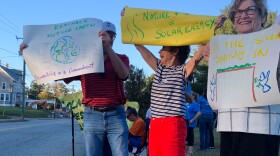The National Oceanic and Atmospheric Administration said Rhode Island and Connecticut both had their warmest summers on record this year. As climate change continues to progress, a panel of scientists is arguing there's an urgent need to improve the way we forecast the impact of climate change.
Mark Urban said climate change predictions are kind of a mixed bag. On the one hand, we've got really strong computers that can make snappy statistical models and predict how animals interact, or how a species responds to warmer temperatures.
"Once we develop these models," Urban said, "we go to look for the data to put in the models, and we find there is no data there to put in for most species."
Urban studies ecology and evolution at UConn. And he's one of nearly two dozen scientists who published an article in the journal Science saying biology needs more boots on the ground collecting basic data like animal birth rates, habitat ranges, or an ability to respond to changes in precipitation or temperature.
"We're not going to be able to do this for the four to 12 million species out there," Urban said. "But we will be able to do it for, perhaps for a set of species, which we can then understand those responses to climate change and try to draw conclusions from that more limited set."
Alongside building better climate change models Urban said biologists also need to do more real-world simulations of climate change. Think melting permafrost and releasing its nutrients into an Arctic stream or laying heat cables in a forest to warm it up and watch for any unexpected results a computer model couldn't predict.
"We need to make the models because we need to lower that uncertainty which is huge right now," Urban said. "Then in concert, I think we need to try to do these manipulations that can sort of indicate those surprises."
Just as weather forecasting has made huge leaps in the last few decades, allowing us to track how our climate is changing, Urban said similar leaps are needed in climate change science if we want to better understand what warmer temperatures could mean for animals and for ecosystems at risk.





